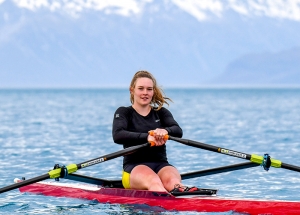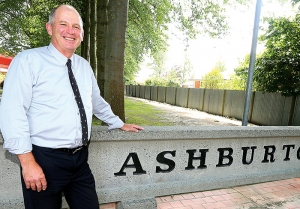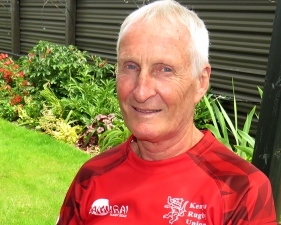Search

 Ashburton rower Mollie Gibson is eyeing up another big summer on the water. Photo supplied.For Mollie Gibson, 2019 is going to be huge.
Ashburton rower Mollie Gibson is eyeing up another big summer on the water. Photo supplied.For Mollie Gibson, 2019 is going to be huge.
A champion rower who has her eyes set on future glory on the water, she has an additional ball to juggle next year, having been named Ashburton College’s head girl for 2019.
But she’s ready to give it her all, on and off the water.
The 2018 rowing season was a massive one for Gibson, after taking three golds and a bronze medal at the New Zealand Secondary School’s Maadi Cup regatta at Lake Karapiro.
From there Gibson made the New Zealand junior rowing team for the World Rowing Junior Championships in the Czech Republic.
Gibson said the highlight of any secondary school rower’s year was the Maadi Cup.
“Maadi Cup never fails to be the highlight and this year was no different.
“It was such an amazing week and was really great to see so many of us achieve our goals we had set out for,” Gibson said.
But this year that experience was topped by the trip to Europe for the junior worlds.
She said being part of the New Zealand junior team campaign was incredible.
She said she got to experience the next level of racing and spend time with the most incredible bunch of people.
“Representing New Zealand was such an amazing opportunity and I would be really eager to give it another go in the future.
“I don’t want to get ahead of myself however, and so I know I just need to be consistently working hard and hopefully it will pay off.”
Ultimately, every young rower’s dream was to go to the Olympics one day, but Gibson wasn’t thinking too far ahead at the moment.
She just wanted to take things as they came.
With the 2018/19 season under way, Gibson was focusing her attention on some of the smaller regattas at the moment before moving her focus to the big ones – nationals in February and the Maadi Cup in March.
“I am hoping for a junior trial from that and it just depends on how successful that is as to what the rest of 2019 looks like,” Gibson said.
This year, her rowing schedule would have to fit around a busy schooling schedule.
She was not only in her final year of secondary schooling and making plans to head to university next year, but she was also Ashburton College’s head girl.
She said her naming as head girl took a while to set in but she was looking forward to the challenge.
And a challenge it would be, balancing head girl duties, vital year 13 studies and rowing.
“I am expecting it to be a lot of work but I am ready to take it as it comes and do my best to keep a good balance between the three and hopefully get the results I am after,” Gibson said.
“It will be a good challenge for me and I am looking forward to tackling it.
I know I have plenty of support so I have no doubt everything will go to plan.”
Off the water, Gibson saw herself going to university in 2020, but she wasn’t yet sure what she wanted to study.
On the water, a lot of Gibson’s future plans rested on how the 2019 season went and what opportunities were available, but she wanted to continue rowing after she finished school.
As a rower she has plenty of idols to look up to, and to aspire to be like.
New Zealand has produced a number of world beaters in recent years, but for Gibson, her inspiration was closer to home, as some might expect, in a fellow Ashburton rower.
“Veronica Wall has definitely been a huge inspiration for me as she’s been around since I started rowing and has taught me a lot,” Gibson said.
“I would say I am very lucky to have had her to train and compete with for the last couple of years.”
Wall had made a name for herself in recent years, dominating at the Maadi Cup and winning 18 gold medals at both club and school level over the past four years.
She also made the trip to the Czech Republic with the junior team for the world where she rowed in a single.
Gibson rowed as part of the quad in the Czech Republic and said she didn’t have a favourite boat, she loved aspects of each of them.
But she did enjoy racing a single as when you were in a boat by yourself, it was all on you, and that was special.
“I also love rowing with my friends in quads or doubles as you have someone to share the successes with which is awesome,” Gibson said.
She hoped to continue rowing a variety of boats over the next couple of year and just see where things took her.
By Erin Tasker © The Ashburton Guardian - 28 December 2018
 Ashburton College principal Ross Preece says 2018 has been a year of consolidation. Photo Susan SandysAs he wraps up his second year as principal of Ashburton College, Ross Preece says it’s often the things the community doesn’t see that a school uses to measure its success.
Ashburton College principal Ross Preece says 2018 has been a year of consolidation. Photo Susan SandysAs he wraps up his second year as principal of Ashburton College, Ross Preece says it’s often the things the community doesn’t see that a school uses to measure its success.
And for him, receiving a Ministry of Education ERO report that gave the college high pass marks all round, is the best reward any principal could receive.
“It comes around every three years and this time round we were rapt. It’s like getting a medical to a person, it’s our clean bill of health,” Preece said.
Like any good news from a school, a positive ERO often flew under the radar; a bad one would make it into social media, he said.
“And we all know if it’s up there on Facebook, then it must be true. But these guys are the experts and they were very affirming in what they found.”
A major event for the college over the past year had been work on curriculum changes that would impact on Year 9 students next year, Preece said.
The school was moving to an innovative pilot for first-year students that would see them involved in a project-based learning model that sees the integration of some subjects rather than working on the traditional standalone subject model. Up to 12 hours of a student’s week will be spent in the integrated subject model.
About 50 per cent of next year’s Year 9 students will be taking part in the pilot and the option had been really well supported by parents. The change was significant for a school and preparation for next year’s pilot had absorbed a considerable amount of staff time this year, Preece said.
“The idea is to prepare students for what will be an uncertain future in a changing workplace.”
The new school year would also see the start of a new Ako programme that would replace family form time.
Across the school there will be 64 groups of about 16 students, each made up of students from Year 9 to 13. They will meet for one hour each week as well as for a short time on Monday and Friday mornings.
Those groups will create a ‘family’ within the school where students can be taught a range of values. They will also provide opportunities for mentoring and peer support.
Looking ahead to 2019, Preece said he took a fair amount of satisfaction in knowing the year would start with the college all but fully staffed.
“We could be a little short in digital technology. Those teachers are as rare as hens’ teeth because if they’re industry capable they can earn far more money in their industry than they can in teaching,” he said.
Ashburton was fortunate, Preece said, in that it was seen as an attractive place to live and the college was seen as a progressive place to teach.
“Our school’s in great shape and our recent appointments were interested in applying because we’re undertaking curriculum reform. We’re an existing school that’s looking to the future.”
The college will start 2019 with a slightly lower roll than this year, but 2018 had a very large intake of Year 13 students. Student numbers, however, will be higher than ministry predictions, he said.
The college was also experiencing a growing trend where Year 12 students were leaving for employment. That they were able to find work in their own district was a great outcome for the college, the students and the community, Preece said.
Currently the school was at 100 per cent occupancy and that wouldn’t change next year with its predicted roll, he said.
Every year numbers were usually higher, with a number of previously unenrolled students turning up.
There are 263 known Year 9 entrants, up on the ministry’s prediction of 245.
And that meant space would continue to be at a premium and would remain so until the long-awaited classroom rebuild was signed off.
Preece has been working with the school board and the Ministry of Education during the year on a rebuild programme he says will take the college well into the future. How extensive that rebuild will be is as yet unknown, but he’s hopeful it will be extensive and that details will be known early in the new year.
Like many principals around New Zealand, Preece and his staff have to deal with a wide range of student behaviours and, like most, during the year he was forced to defend allegations that the school had a bullying culture after a video of students fighting was filed on social media.
Through social media, issues were often blown out of proportion, but any incidents relating to bullying or anti-social behaviour were taken very seriously by the school board, he said.
The school worked with the New Life Church to provide an on-campus buddy system, 24/7, that saw older teens available during break time to talk with students in a mentoring role.
“They do a fantastic job of supporting students. They’re not trained counsellors but they’re a listening ear.”
The year will also begin with the threat of strike action hanging over schools across the country.
Secondary teachers will join their primary counterparts in strike action over both pay and conditions.
And Preece has long been outspoken about the imbalance between teachers’ pay rates and the huge and varied workload they now carry.
He’s concerned at the dwindling number of teachers who want to move up to the role of principal and said there will shortly be a large exodus at the top with many principals now edging towards retirement.
For younger teachers, the incentives were not there to take on senior roles the same as they were not there for young people to take on what was an incredibly rewarding job as a teacher, he said.
By Sue Newman © The Ashburton Guardian - 26 December 2018
 Murray Roulston returned to New Zealand earlier this month after a stint coaching in Kenya. Photo Erin TaskerAs a rugby coach Murray Roulston has travelled the world teaching players the ins and outs of the game he loves, but his latest coaching job was by far the biggest challenge he’d ever tackled.
Murray Roulston returned to New Zealand earlier this month after a stint coaching in Kenya. Photo Erin TaskerAs a rugby coach Murray Roulston has travelled the world teaching players the ins and outs of the game he loves, but his latest coaching job was by far the biggest challenge he’d ever tackled.
Roulston has spent much of the past year in Kenya coaching the national side and trying to build a pathway for the future in a country where rugby was the fastest growing sport, and while he found that there was no shortage of talent, a vital part of the jigsaw puzzle was well and truly in short supply.
That was money.
Roulston said when he arrived, players weren’t coming to training because they hadn’t been paid for three months.
In a country where money and jobs were hard to come by, they simply couldn’t afford to get there.
“The corruption in Kenya is unbelievable.
“You can talk to four different people and you get four different stories and you have to work out who’s talking the most truth, so it’s unbelievably challenging,” Roulston said.
“I can assure you it was the hardest place I’ve ever been in my life for coaching.
“Unless you were there to experience it, you wouldn’t know how tough it was.”
Roulston went to Kenya believing the money, resources and facilities would be what was required to do the job, but quickly found out that things weren’t as they seemed.
There was no set training ground, the gym was barely bigger than a kitchen, and the weights and equipment were old-fashioned.
Basically, the facilities were non-existent, Roulston said.
“I think we had seven different training grounds while I was in Kenya in the first stint, and we had to keep changing because they didn’t have the money to pay the fund for the fields,” Roulston said.
Although there were challenges, there were plenty of positives too, and the biggest one of those was the talent, Roulston said.
“The exciting thing is, in Kenya if they can get their act together the athletes are there.
“The talent is there; the talent is unbelievable,” Roulston said.
“If we were just there to coach the rugby, it would be easy.
“But around every corner, there’s an obstacle.”
He attended schoolboy tournaments and the talent he saw was as good as anywhere in New Zealand.
And Roulston knows his stuff.
After growing up in Mid Canterbury and playing more than 130 games for his home province during what was a golden era for Mid Canterbury rugby, playing for the South Island three times and making All Blacks trials once, Roulston turned to coaching.
He coached Mid Canterbury’s under-18s, then the senior side, before heading to Wanganui in a rugby development officer role.
From there he headed to Otago where he again worked in rugby development for eight years, coaching the Otago B and sevens sides, and running their academy.
He then did a six-week stint in Japan and they wanted him to stay on, but with dreams of coaching Otago, Roulston returned home.
Those dreams were dashed when Otago brought Laurie Mains back from South Africa though, so Roulston decided to head back to Japan.
He returned to New Zealand to take up a role as high performance director of rugby for the Highlanders region, before the Hurricanes came calling.
He spent six years with the Hurricanes before being asked to go to Romania to help out for a couple of months, and from there he headed to Trinidad and Tobago in a director for rugby role.
That was an eye-opening experience that would be topped only by what met him in Kenya, and when he returned from Trinidad just before the Rugby World Cup in 2011, Roulston decided it was time to finish.
That was, until Kenya came calling.
“They phoned up in December 2017 and said ‘we have been looking for a New Zealand coach and we have come up with your name and we want you to come to Kenya’,” Roulston said.
“I said ‘no show’ and left it at that.”
But three days later they called again and tried to talk him around. Roulston said a friend of his in the North Island, Ian Snook, could be the man for the job and suggested he could give him a call.
Snook was keen but said he’d only do it if Roulston went too.
So Roulston decided to give it a go and the pair headed over, with Snook taking on a head coach role and Roulston his assistant.
The pair took up a year contract in Kenya which takes them through to March next year.
But when Roulston returned to New Zealand in December, whether he’d return was still up in the air.
He hadn’t been paid for two months.
Money was one of the biggest challenges in Kenya.
Funding for all sports had dried up, so it was off the park where the biggest challenges came.
On the park, Kenya had piles of potential, Roulston said.
Under Roulston and Snook, Kenya played Uganda in the Elgon Cup before playing in the African Gold Cup where a spot at the Rugby World Cup was on the line.
They played Zimbabwe, Uganda, Morocco, Tunisia and Namibia and won all except the one against Namibia, so the Namibians took that world cup spot.
Kenya had one last chance to qualify for the world cup, through a repecharge in France with Germany, Hong Kong and Canada, but again they missed out.
The team wasn’t helped by the fact that most of their preparation games ended up not happening, and they didn’t know if they’d even be going to the repecharge until two hours before they were due to leave because no one had been paid.
When their money came through, they went.
With money and jobs so hard to come by and only about five of the players playing under Roulston and Snook having some sort of employment, and eight or nine studying, they had to improvise.
They’d train at 6am, to allow the players who did have work to go to, to get there.
But sometimes even getting there was a challenge.
One day a player was a couple of hours late to training; turned out he’d been held up at gunpoint on the way.
That wasn’t an unusual occurrence.
Between his stints in Kenya and Trinidad, Roulston had witnessed his fair share of trouble.
But, he never felt unsafe.
After a challenging eight months in Kenya, Roulston was hopeful about the future of the sport he’d made a career from, in the African nation which had already proven itself to be a threat on the sevens stage.
But he said to get things to where they needed to be in terms of 15s rugby, it was really a five-year programme, and at the moment there just wasn’t the money to make it happen.
“The exciting thing for us is the CEO said that the results we got were the best in Kenyan history,” Roulston said.
“The exciting thing is the players are there, the capability is there, it’s just whether they can ever get their society right from the government down and get the right procedures in place to get the rewards that they deserve.”
Kenya had been a challenge, but it was one Roulston was glad he’d taken on.
“All in all it was a hell of a life experience and I’m so pleased I did it.”
By Erin Tasker © The Ashburton Guardian - 26 December 2018


